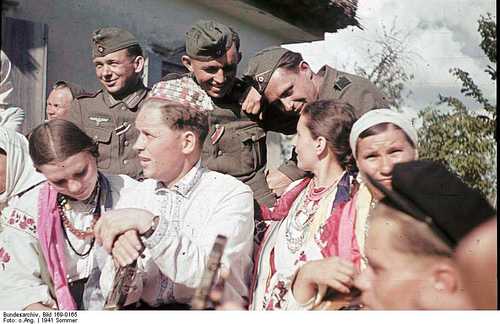
German Forces
Liberators.
Bundesarchiv.
German soldiers fraternize with Ukrainian peasants, August/September (?) 1941. Clearly a posed propaganda photo; it is very obvious that the Ukrainians are wearing their "Sunday best". The Germans stepped into a very complex political situation in the Ukraine. Certainly, there were pro-Soviet elements. However, Ukrainian separatism/nationalism had been greatly strengthened by the experience of famines effectively engineered by Lenin and Stalin in the interwar period for economic and social engineering reasons. The arrival of the Germans posed a question to the Ukrainian nationalists - should they wholeheartedly back the Germans as liberators, or should they adopt a waiting game, supporting the Germans conditionally, and using the opportunity of German cover to develop civil and military institutions of their own ? From the German point of view, the question was whether they should adopt a strategy of co-operation and indirect exploitation towards the Eastern peoples who had fallen under their control unexpectedly suddenly, or whether they should simply adopt a strategy of outright exploitation of the resources of the captured territories, both physical and human. On one side of the German argument were the German Foreign Ministry (Minister Ribbentrop), who favoured the establishment of puppet states in the East (essentially, to give themselves something to do) and Commissioner for the Eastern Territories, Alfred Rosenberg. Rosenberg was an important person in the development of Nazi ideology (such as it was). He regarded Slavs, not as subhumans, but as "lesser Aryans" capable, usefully, of being led by the Germans from the top of the Aryan tree. They were faced, on the "outright exploitation" end of the discussion, by Himmler (with his visions of an Eastern slave empire under SS control) ... and by Hitler, whose reaction to the early success of Barbarossa inclined him to extend his contempt of Bolshevism to the people who had, in fact, been suffering under Bolshevism for many years. No contest. The harsh treatment that resulted for the peoples of the East did not prevent the strongly anti-Russian Ukraine, at least, from providing considerable assistance to the Germans. By the end of the war, two "Galician" Volunteer Divisions had been raised by the Waffen SS, with the co-operation of the collaborationist Ukrainian authorities. Also, numerous collaborationist police and security units were raised in the Ukraine, that functioned in roles ranging from local security, to anti-partisan activities, to participation in "special actions" against Jews, to guarding concentration and death camps in Poland. Whatever the reservations of elements of the Ukrainian political class about the Germans, one wonders how much more benefit the Germans could have obtained - from the Ukraine and other occupied territories in the East - if they had opted for a strategy closer to that of Ribbentrop and Rosenberg ... One of those dangerous "what ifs" ... Best regards, JR.
3101 Views
9/19/2009
